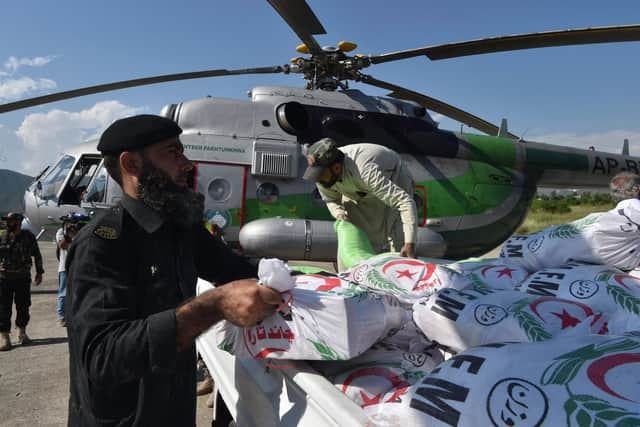Pakistan floods: UN seeks £136m of emergency aid for victims
UN secretary-general Antonio Gutteres said Pakistan’s flooding, caused by weeks of unprecedented monsoon rains, were a signal to the world to step up action against climate change.
“Let’s stop sleepwalking toward the destruction of our planet by climate change,” he said in a video message to an Islamabad ceremony launching the funding appeal.
“Today, it’s Pakistan. Tomorrow, it could be your country.”


Advertisement
Hide AdAdvertisement
Hide AdMore than 33 million people, or one in seven Pakistanis, have been affected by the catastrophic flooding, which has devastated a country already trying to revive a struggling economy.
More than one million homes have been damaged or destroyed in the past two-and-a-half months, displacing millions of people.
Around half a million of those displaced are living in organised camps, while others have had to find their own shelter.
According to initial government estimates, the devastation caused 10 billion dollars (£8.5 billion) in damage to the economy.
“It is a preliminary estimate likely to be far greater,” planning minister Ahsan Iqbal told the Associated Press (AP).
More than 160 bridges and more than 3,400 kilometres (2,100 miles) of road have been damaged.
Although rains stopped three days ago, large swathes of the country remain underwater, and the main rivers, the Indus and the Swat, are still swollen.
The National Disaster Management Authority on Tuesday warned emergency services to be on maximum alert, saying flood waters over the next 24 hours could cause further damage.
Advertisement
Hide AdAdvertisement
Hide AdRescuers continued to evacuate stranded people from inundated villages to safer ground.
Makeshift tent camps have sprung up along motorways.
Meteorologists have warned of more rains in coming weeks.
“The situation is likely to deteriorate even further as heavy rains continue over areas already inundated by more than two months of storms and flooding. For us, this is no less than a national emergency,” Pakistani foreign minister Bilawal Bhutto-Zardari said, urging the international community to give generously to the UN appeal.
“Since mid-June, in fact, Pakistan has been battling one of the most severe, totally anomalous cycles of torrential monsoon weather,” he said.
Rainfall during that time was three times the average, and up to six times higher in some areas, he said.
The UN flash appeal will provide food, water, sanitation, health and other forms of aid to some 5.2 million people, Mr Gutteres said.
“The scale of needs is rising like the floodwaters. It requires the world’s collective and prioritised attention,” he said.
The flooding catastrophe, however, adds new burdens to the cash-strapped government.
It also reflects how poorer countries often pay the price for climate change.
Advertisement
Hide AdAdvertisement
Hide AdSince 1959, Pakistan is responsible for only 0.4% of the world’s historic CO2 emissions.
The US is responsible for 21.5%, China for 16.5% and the EU 15%.
Several scientists say the record-breaking flooding has all the hallmarks of being affected by climate change.
“This year, Pakistan has received the highest rainfall in at least three decades,” said Abid Qaiyum Suleri, executive director of the Sustainable Development Policy Institute and a member of Pakistan’s Climate Change Council.
“Extreme weather patterns are turning more frequent in the region and Pakistan is not an exception.”
